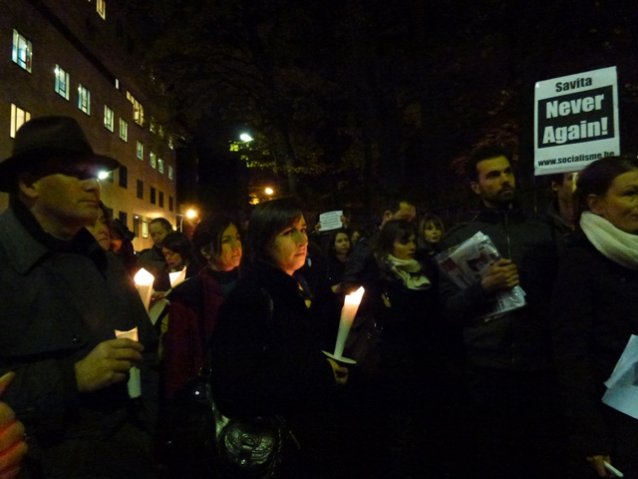EWL members protest restrictive abortion law in Ireland and pay tribute to Savita Halappanavar

[Brussels, 22 November 2012] On Wednesday 21 November a vigil was organised in front of the Irish Embassy in Brussels to pay tribute to Savita Halappanavar and to protest against the very restrictive Irish abortion law. Around one hundred people gathered with candles and observed a minute of silence in her memory.
Savita Halappanavar died in October from blood-poisoning after being denied an abortion by the medical profession in a hospital in Galway Ireland. An international day of tribute was organised to put pressure on the Irish government to change the abortion law and protest against such a tragic death.
The European Women’s Lobby President Viviane Teitelbaum, speaking on behalf of the EWL and the Belgian Council of Women, stated that “country in Europe will be built on the grave of any woman, we demand respect for women, for their autonomy, their independence and expect that Europe stands with us”. She called on the Irish government to legislate for abortion in Ireland to ensure that women’s rights are guaranteed in a 21st century progressive European Union and reaffirmed that “in solidarity with our Irish friends we will remain at their side until this battle is won!” Today, she said, “we are all here as we all are SAVITA HALAPPANAVAR”.
Three other speakers also called for the respect for women’s rights in Ireland and a change to the Irish constitution to broaden the conditions for abortion.

Viviane Teitelbaum, EWL and CFFB president
The abortion law in Ireland is one of the most restrictive in Europe, where it criminal offence for women who have or attempt to have abortions as well as for those that assist them. However, an amendment to the Irish Constitution following a referendum in 1983 recognises the “right to life of the unborn and, with due regard to the equal right to life of the mother (…)”. (Article 40.3.3 of the Irish Constitution) The interpretation of this Article by the Supreme Court following the X case in 1992 (which involved a 14 year old girl who was pregnant as a result of rape) upheld that there is a constitutional right to abortion where there is a risk to the mother’s life. In spite of this, no further legislation was passed to give effect to the Supreme Court’s judgement which means that women and the medical profession continue to be at risk of criminal charges. Three further cases, known as A, B, and C in which abortion was refused, were challenged in the European Court of Human Rights who in 2010 ruled that Ireland’s failure to implement the existing constitutional right on abortion when a woman’s life is in danger risks violating the European Convention on Human Rights (ECHR) and in particular Article 8 (the right to respect for private and family life without unnecessary interference by a public authority). The ECHR also stated in its judgement that the heavy criminal penalties for having or assisting an abortion constitute a “chilling factor” for both women and the medical profession. In January 2012 the Irish government set up an expert group to explore options to implement the judgement. To date, the report of the expert group has not been made public.
In the meantime, Savita Halappanavar, a 31 year-old Indian dentist, was 17 weeks pregnant when she was admitted on 21 October to a hospital in Galway. She was suffering from severe pain and despite confirmation by doctors that she was miscarrying, she was denied an abortion. The reason given was that a foetal heartbeat was detected and that Ireland, as a “catholic country” could not carry out a termination. The foetus was surgically removed three days later when there was no longer any sign of a heartbeat. Savita Halappanavar died on 28 October of septicaemia (blood-poisoning). Thousands of people marched in Dublin and in other Irish cities last week to protest against this tragic death and to call for legislation on abortion.





